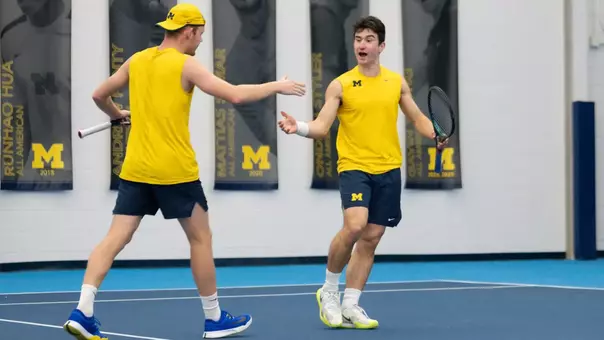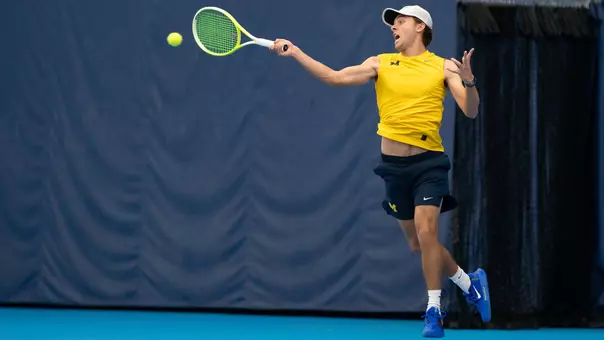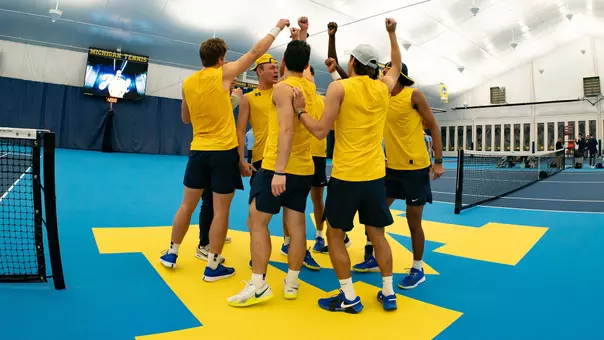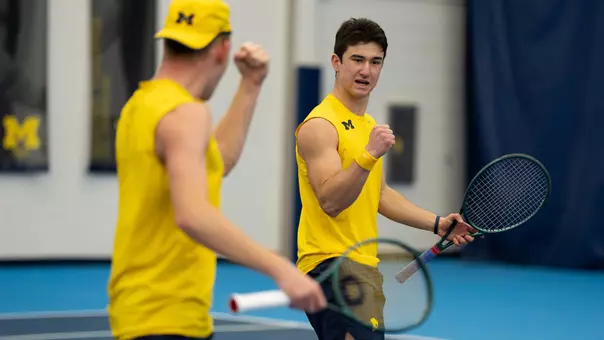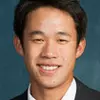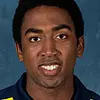
King of the Tennis Court
10/12/2010 12:00:00 AM | Men's Tennis
Oct. 12, 2010
By Joanne C. Gerstner
Michigan star sophomore tennis player Evan King knows he lives in fortunate times.
Talented players that came before him usually had to make a very tough choice: play in college and likely forfeit a real shot at the ATP tour, or skip college and try the pros.
Neither option worked well. Players with professional potential who chose college were shut out of the tour because of their advanced age. And the players who went pro later regretted not having a college education when their tennis careers failed to materialize.
The tennis world has thankfully evolved, allowing King to play collegiate tennis and get an education, plus prepare himself for a professional career.
"I know I've got it good, I totally realize that," said King, who was honored as the 2010 Big Ten and ITA/Midwest Freshman of the Year. "I don't know how they made that choice in the past. I always wanted to go to college, play tennis, but my bigger goal is to play professionally and be successful.
"Asking somebody to choose between all that seems very tough. I'm lucky that I am being supported by a lot of great people here at Michigan, but also at the USTA (United States Tennis Association) in becoming the player I want to be."
Current pros such as Americans John Isner (University of Georgia) and Kevin Anderson (Illinois) and Germany's Benjamin Becker (Baylor) all had strong NCAA careers. Then they jumped to the pros.

King, who came to Michigan as one of the top-ranked juniors in the country, has been on a roll since the late spring. He played well at No. 1 singles and doubles during the Big Ten, ITA and NCAA seasons, thanks to subtle upgrades in his game.
Under the watchful guidance of Michigan coach Bruce Berque, King placed more emphasis on his first serve as a weapon. Berque also helped King change his match strategy from being more passive, as in getting a lot of balls back, to being the aggressor.
"Those were big changes for me," King said. "Seeing how I could constantly attack instead of picking my spots took practice. I think that really started kicking in around the start of the summer."
King's momentum indeed continued into the summer season, as he won his first pro tournament. He took the doubles title at the USTA Futures Tournament, a form of minor leagues for up-and-coming pros, in Godfrey, Ill. Amateur players can enter pro tournaments, but forfeit prize money to retain eligibility.
King also was selected to be part of the USTA Collegiate program, which provides extra coaching and assistance to elite players. He played in the junior U.S. Open and reached the round of 16. The Grand Slams all have their own junior tournaments for ranked players under 18, along with the marquee pro tournament. The best in the world, from Roger Federer to Andre Agassi to John McEnroe, cut their teeth in the Grand Slam juniors. King's strong showing proved he is an American player to watch in the future.
King is now back to the college grind, and finding ways to become even stronger and better. He is ranked No. 95 in singles and No. 12 in doubles with senior teammate Jason Jung by the ITA. He will be again playing at the top of the Wolverines' line-up in singles and doubles.
This fall, he is concentrating on developing his core and overall strength, making him better able to handle the raw power of today's game. He stands 6-foot-1, which is becoming a mere average size for a male player. King has some built-in advantages though, being a lefty with natural court sense and good hands. Left-handed players have a leg up on the righty-dominated tennis world, as they can generate different spins and looks that stymie opponents.
Top players such as Rafal Nadal, McEnroe and Martina Navratilova all crafted superior games off their crafty lefty style.
"I won't lie, I'm happy to be a lefty because it really can confuse some players," King said, adding a laugh. "But by the same token, once you get to the juniors, college level and pros, you have to have everything else to succeed too. I am practicing and working out as much as possible."
"Everybody sees Evan's potential and talent. Now it's up to him to take that next step and become one of the best players in the college game. It's how you respond when everybody looks at you as the best -- the special ones thrive and win the big matches and tournaments."
-- U-M head tennis coach Bruce Berque
Berque sees the time King is putting in, both on and off the court, and thinks it will make a big difference.
"Evan's play over the last few months could really be a springboard for him to move to the next level as a player," Berque said. "Everybody sees Evan's potential and talent. Now it's up to him to take that next step and become one of the best players in the college game. It's how you respond when everybody looks at you as the best -- the special ones thrive and win the big matches and tournaments.
"Evan has that capability and he's working hard to get there. He's just a sophomore, but all these experiences he's having will only prepare him for the future."
Berque fully supports King's dream of playing professional tennis, and is helping him be as prepared as possible. Former Michigan great MaliVai Washington, who jumped from a successful collegiate tennis career to a strong pro career in the mid-80s, is serving as a mentor to King.
Berque made sure the two met up at the NCAA Tournament. They caught up again at the junior U.S. Open, where Washington watched King's matches with a keen eye.
"It's the best to have somebody like Mal, who has been exactly where I am, really be honest and give me advice about everything I need to know about now and for my future," King said. "Mal's best advice so far has been to enjoy everything about being at Michigan: being on the team, school, being part of college life. He said those were some of the best times he had in his life playing tennis.
"I'm in no rush to leave this behind for the pros. I've got a lot to prove here and I want to really enjoy all of it."

